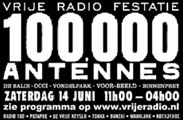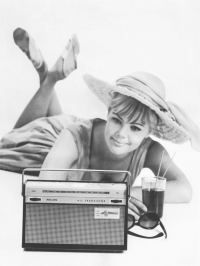Institute of Artificial Art Amsterdam
Random Radio Department
|
|
|
 Agent Radio Agent Radio
 Radio Dom Radio Dom
 Other Projects Other Projects
|
The Department of Random Radio promotes the establishment of dedicated radio stations for the diffusion of sound-environments created by algorithmic music, physical processes, industrial machinery, randomly selected audio-documents, and arbitrarily sampled live sound.
Our aim is to create a global network of fully automatic permanent radio stations which together take up all available bandwidth. Stations controlled by human persons broadcasting expressive music and manipulative messages should be abolished.
|
|
Statements
and Discussions on Radio and Media Policy
|
|
|
Arthur
Elsenaar & Remko Scha: "Voor Automatische Radiostations in
de Vrije Ether."
["For
Automatic Radio Stations in the Free Ether."] |
|
|
Huge
Harry: "Radio for Everyone; a Computer's Reflections on the Future
of Broadcasting." In: Eric Kluitenberg (ed.): New Media
Logbook KUNST.NRW.NL, pp. 28-29. Amsterdam: De Balie, September
1999. [Reprinted in: Michael Fahres and Othmar Schimmel (eds.): Soundscapes
be)for(e 2000, pp. 43-46. Amsterdam: Centre for Electronic Music,
1999.] |
|
|
Huge
Harry: Letter of recommendation for the project "Radio Dom" (Fragment). Catalogue Panorama 2000, Centraal Museum, Utrecht,
1999, pp. 130-131. |
| |
Symposium "The Future of Radio in the Era of
Digital Transmission". November 28, 2001, RadioLab, Walter Maas-Huis, Bilthoven, the Netherlands. Presentations by Ton van Asseldonk
(TVA Development), Anneke van Baarsel (project manager T–DAB, Directoraat-Generaal Telecommunicatie en Post), Arthur Elsenaar
(IAAA), Pieter Hooijmans (Integrated Transceivers, Philips
Research Labs), Ad Ossendrijver (Radio Arrow Classic Rock),
Remko Scha (IAAA).
|
| |
"100.000 antennes". De Balie, 14 juni 2003. Discussie met Hansje Kalt (Amsterdam Anders), John Goring (VVD), Hans Bakker (SP), Maik Ter Veer (ADeM), Freek K. (Vrije Ruimte), Kees Vendrik (Groen Links), Remko Scha (UvA), Gerrit Kalsbeek (VPRO), Arthur Elsenaar (IAAA), Wil Codrington (Groen Links), François Laureijs (ex-SALTO), Willem Sijthoff (Business Nieuws Radio). Chairs: Erik Bout (Radio 100), Pieter Hilhorst (De Volkskrant).
 Waar moet het heen met de vrije ruimte en de culturele vrijplaatsen in de grote steden? Heeft het beginsel ‘geen cultuur zonder subcultuur’ haar geldigheid verloren? Is vrije ruimte gebonden aan fysieke locaties? Wat zijn de gevolgen van het nieuwe radiobestel voor de inhoudelijke kwaliteit van de radio? Kan niet-publieke, non-commerciële radio overleven in dit nieuwe bestel? Waartoe zijn politici bereid om deze culturele verarming van de radio te voorkomen? Waar moet het heen met de vrije ruimte en de culturele vrijplaatsen in de grote steden? Heeft het beginsel ‘geen cultuur zonder subcultuur’ haar geldigheid verloren? Is vrije ruimte gebonden aan fysieke locaties? Wat zijn de gevolgen van het nieuwe radiobestel voor de inhoudelijke kwaliteit van de radio? Kan niet-publieke, non-commerciële radio overleven in dit nieuwe bestel? Waartoe zijn politici bereid om deze culturele verarming van de radio te voorkomen?
|
[2 quotes from Herbert Brün]
Percussion and I, we met when I was eight
years old, in Berlin, in my father's study which he had converted
into a workshop for his experiments with a crazy new idea: Radio.
Although he was, by profession, an engineer, he was a soft-spoken,
mild-mannered, radically-thinking dreamer, who really believed that
with the help of Radio it would be at last feasible to inform all
the people in the world of the enormous potentials of the human
mind, to kindly and gradually liberate all the people in the world
of their errors, superstitions, inherited and obsolete creeds, their
beliefs in more or less than human powers, demons and divinities
and, last but not least, to free them of their self-enslaving obedience
to what they had been told by crooks to be laws of human nature,
to be laws of justice, to be laws of economy according to the merits
of criminally-induced scarcity. So he dedicated his evenings to
the idea of a popular, widely accessible radio network.
Occasionally he invited me to lend him a hand
or two hands, literally to grab, hold, and not let go, dozens
of loose ends of thin antenna-wire, which, connected somewhere
in the room to something with a spool and a few tubes, and extending
criss-cross under the ceiling and down the walls, still had to
be connected to some metal rod at the window. Valiantly I stood
and held and did not let go unless told to relinquish my grasp.
Just as I feel today, sixty-five years old, I felt then the incomparable
delight in being needed for something of which I know, whether
I understand it or not, that it is important, necessary, and by
someone very much wanted. Also, today, I assert that Radio can
effectively implement my father's dream and that all he wanted
has become at last feasible.
Only it wasn't and isn't done.
Herbert Brün: "...
as to Percussion," Interview by Tom Siwe (1984).
In contradistinction to Industry and Business who
must dominate the system to which they adjust, Technology and The
Arts need neither dominate nor adjust. Composers and technologists
are not concerned with the exploitation of, and adjustment to, problems.
They are concerned with the solution of problems and, as a first
step in this direction, with the design of models, structural analogies,
of the desired solution.
The construction of models for
problem-solving in the broadest and most general sense is the
goal which Technology and Composition have in common. In order
to reach and to effectively demonstrate this goal they have to
preserve their independence from temporarily ruling values which
always imply and reaffirm only the system that ought to be investigated
and that gave rise to the problem.
If technologists and composers were
to join forces in an internationally supported endeavor of systems-research
and systems-creation they could hope to avoid loops of futility,
to preserve their independence from temporarily ruling values,
to reach and to effectively demonstrate their goal. Their findings,
discoveries, suggestions, and explanations should throw considerable
light, be it welcome or not, on our ability of changing, if need
be, just those concepts which we most automatically take for granted.
Herbert Brun: Technology
and the Composer, Explanatory Addition.
Presented to the United
Nations Educational, Scientific, and Cultural Organization
(UNESCO) in Stockholm, June 1970.
|
|

 Waar moet het heen met de vrije ruimte en de culturele vrijplaatsen in de grote steden? Heeft het beginsel ‘geen cultuur zonder subcultuur’ haar geldigheid verloren? Is vrije ruimte gebonden aan fysieke locaties? Wat zijn de gevolgen van het nieuwe radiobestel voor de inhoudelijke kwaliteit van de radio? Kan niet-publieke, non-commerciële radio overleven in dit nieuwe bestel? Waartoe zijn politici bereid om deze culturele verarming van de radio te voorkomen?
Waar moet het heen met de vrije ruimte en de culturele vrijplaatsen in de grote steden? Heeft het beginsel ‘geen cultuur zonder subcultuur’ haar geldigheid verloren? Is vrije ruimte gebonden aan fysieke locaties? Wat zijn de gevolgen van het nieuwe radiobestel voor de inhoudelijke kwaliteit van de radio? Kan niet-publieke, non-commerciële radio overleven in dit nieuwe bestel? Waartoe zijn politici bereid om deze culturele verarming van de radio te voorkomen?